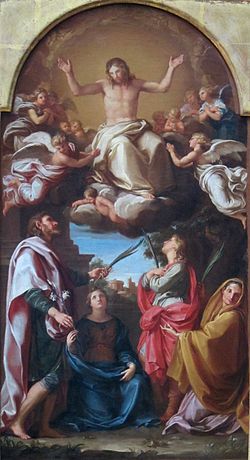 |
| Christ with Saints Julian and Basilissa, Celsus and Marcionilla, Pompeo Batoni, 1736-8. |
Today the martyrology recalls the martyrdom of St Julian and his wife Basilissa:
At Antioch, in the reign of Diocletian and Maximian, the birthday of the Saints Julian, martyr, and Basilissa, his virgin wife. Having lived in a state of virginity with her husband, she reached the end of her days in peace. But after the death by fire of a multitude of priests and ministers of the Church of Christ, who had taken refuge in his house from the severity of the persecution, Julian was ordered by the president Marcian to be tormented in many ways and executed. With him suffered Anthony, a priest, and Anastasius, whom Julian raised from the dead, and made partaker of the grace of Christ; also, Celsus, a boy, with his mother Marcionilla, seven brothers, and many others.The feast will be of particular interest to Benedictines, because St Benedict drew heavily on their Passio in constructing chapter 4 of his Rule, on the Tools of Good Works.
The Passio Juliani et Basilissae is one of those martyrdom accounts that scholars have, in the past, tended to dismiss as more pious fiction than fact, but there almost certainly is at least some historical basis to it. Regardless, their cult was widespread quite early on, and well established by the sixth century.
The basic storyline of the Passio is that Julian was forced by his family to marry, however reached an agreement with his wife, Basilissa, that they should both preserve their virginity. They proceeded to convert their home into a hospital, and she founded a convent for women (of which she became the superior), while he undertook the direction of a large group of monks.
One of the reasons generally for dismissing the account is the early date claimed for the establishment of cenobitic monasticism. But we know that monasticism did in fact predate St Antony (St Athanaius' propaganda notwithstanding, pre-existing monasteries are actually mentioned in the Life), though it was probably not quite as formalised as the fourth or fifth century Passio suggests.
In any case, according to the Passio, Basilissa and her maidens died a holy death in advance of the Great Persecution of Diocletian, but Julian was martyred - though not before performing several miracles and converting his prosecutor's son and wife. The Passio relates that Julian predicted he would survive the initial attempt to put him to death, and when questioned on how he achieved this, proceeds to give the catechesis that the Rule draws on.
No comments:
Post a Comment